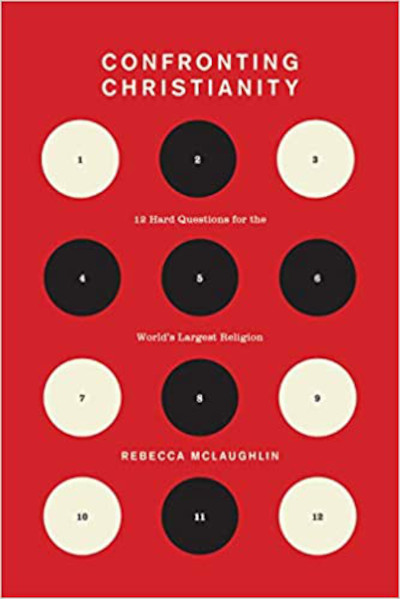Rebecca McLaughlin’s Confronting Christianity: 12 Hard Questions for the World’s Largest Religion is one of my favorite books on contemporary Christian apologetics. This engaging and enlightening work serves as a comprehensive guide for navigating some of the most formidable challenges and objections that confront the Christian faith. McLaughlin’s ability to tackle these issues with depth, research, and empathy makes this book an indispensable resource for anyone seeking a deeper understanding of Christianity.
Structured into twelve thought-provoking chapters, each dedicated to a specific question or objection, McLaughlin tackles topics that have often been the stumbling blocks for believers and non-believers alike. With intellectual rigor and a keen theological understanding, she delves into issues such as the problem of evil, the exclusivity of Christianity, and the complexities of human sexuality. Her approach is characterized by thorough research, drawing from a wide range of sources—from ancient philosophers to contemporary theologians—to engage these complex topics with both nuance and clarity.
The chapters
- Aren’t We Better Off Without Religion?
- Doesn’t Christianity Crush Diversity?
- How Can You Say There is Only One True Faith?
- Doesn’t Religion Hinder Morality?
- Doesn’t Religion Cause Violence?
- How Can You Take the Bible Literally?
- Hasn’t Science Disproved Christianity?
- Doesn’t Christianity Denigrate Women?
- Isn’t Christianity Homophobic?
- Doesn’t the Bible Condone Slavery?
- How Could a Loving God Allow so Much Suffering?
- How Could a Loving God Send People to Hell?
One of the standout features of Confronting Christianity is McLaughlin’s capacity to distill intricate theological and philosophical concepts into accessible and relatable language. Her writing style is both engaging and conversational, making profound ideas approachable for readers with varying levels of familiarity with Christian theology and religious academia. In doing so, she demonstrates a unique ability to bridge the gap between academic and everyday discussions, ensuring that her book is accessible to a broad audience.
Moreover, McLaughlin integrates personal anecdotes and stories to lend a human dimension to her discussions. This personal touch adds authenticity to her book, allowing readers to connect with the material on a more emotional level. It’s through her own experiences that the book becomes more than just a scholarly endeavor; it’s a compelling narrative that breathes life into the philosophical and theological exploration it undertakes.
While Confronting Christianity offers insightful and well-reasoned responses to the objections it addresses, it doesn’t merely offer easy answers. McLaughlin invites readers to engage critically with the material and to enter into dialogue, fostering a sense of curiosity and open-mindedness. This approach is not just about convincing the reader but encouraging them to think deeply and engage thoughtfully with their own beliefs and doubts.
While this book is undeniably a tremendous asset for those interested in Christian apologetics, it’s not without its limitations. McLaughlin’s perspective leans toward a more conservative interpretation of Christianity, which might not fully resonate with readers from more progressive or liberal backgrounds. Additionally, as with any book dealing with complex questions, some readers may find certain objections to Christianity inadequately addressed due to the book’s length and scope. (It’s been my experience that Christian apologetics can often greatly strengthen the faith of the believer while accomplishing very little, if anything, to advance the faith of the skeptic. This is not the failure of Rebecca McLaughlin.)
In conclusion, Confronting Christianity by Rebecca McLaughlin is an extraordinary work of contemporary Christian apologetics. It not only provides compelling responses to some of the most pressing objections to the Christian faith but also encourages readers to explore their own questions and doubts. McLaughlin’s writing is a testament to her expertise in both theology and apologetics and her unique ability to make profound ideas accessible. This book is an invaluable resource for believers seeking to deepen their faith and for skeptics looking to engage in meaningful and respectful dialogue. It is a must-read for anyone interested in exploring the profound questions at the intersection of faith and doubt.
